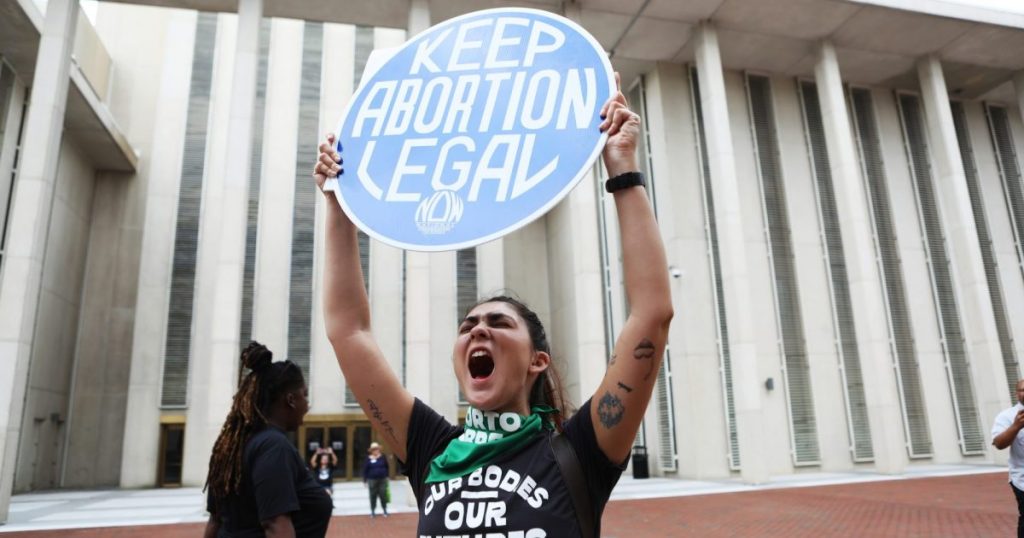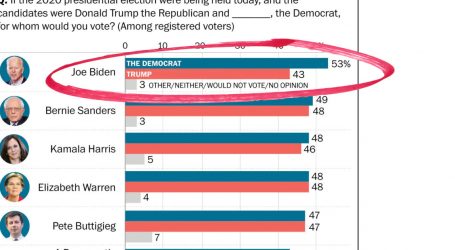Florida Supreme Court Approves a Six-Week Ban—And Lets an Abortion Rights Ballot Measure Move Forward
Abortion rights advocates protested in Florida last year as the legislature debated a six-week ban—which will now take effect next month. The Washington Post/Contributor/Getty
Fight disinformation: Sign up for the free Mother Jones Daily newsletter and follow the news that matters.Florida’s Supreme Court issued a pair of major rulings today on abortion that will both further restrict access in the short-term and allow voters to decide whether or not to expand abortion rights this November.
One of the court’s rulings will allow a six-week abortion ban—signed into law by Republican Gov. Ron DeSantis last April—to take effect, according to the Associated Press.
And in the other ruling, the court decided that Floridians could vote on a ballot measure to expand abortion rights in the elections this November. Voters will weigh a constitutional amendment that would guarantee a right to abortion in the state prior to the point of so-called fetal viability, which is generally understood to be around 24 weeks’ gestation.
The dueling rulings essentially make Florida a microcosm of our fraught national abortion politics, defined by anti-abortion Republicans seeking to curtail access at all costs and abortion rights advocates fighting to restore access—often successfully through ballot measures—following the devastation of the Dobbs ruling.
In allowing the six-week ban to take effect, the court makes Florida one of the strictest anti-abortion states in the nation: Only two other states, Georgia and South Carolina, currently have six-week bans, and 14 others ban abortion more or less entirely. Six weeks is before most people know they’re pregnant, so the law will effectively eliminate the option of abortion for Florida’s 4.6 million women of reproductive age, along with the state’s trans and nonbinary people who seek abortions.
The new ban will also decimate Florida’s status as a “rare haven for abortion rights” in the South, as my Reveal colleague, Laura Morel, reported back in 2022, the same year that a 15-week ban took effect in the state. Even with that law, the state remained a crucial access point for the South, since the majority of abortions occur before 13 weeks’ gestation. There were 8,940 more abortions in Florida last year compared to 2020, amounting to a 12 percent increase, largely driven by out-of-state patients, according to the Guttmacher Institute.
The ruling on the ballot measure presents more of a reason for optimism for abortion rights supporters: As my colleague Madison Pauly has reported, voters have chosen to uphold abortion rights in every post-Dobbs ballot measure on the matter. And public opinion polling has shown that most Florida voters believe abortion should be legal in all or most cases—just like voters across the country.
Grassroots organizers in Florida collected nearly one million signatures last year to petition for the amendment that would guarantee the right to abortion before fetal viability. But the Florida attorney general asked the court to block the measure, alleging it was “too complicated” for voters to understand. Following Monday’s ruling, Floridians Protecting Freedom, the grassroots group that brought the proposed amendment, promised that “Floridians will vote and we will win,” adding that it’s the only way to stop the six-week ban in its tracks.
The Center for Reproductive Rights, a legal advocacy organization, called the ballot measure ruling “a win for democracy.” “This ballot measure could fundamentally reshape abortion access across the US South and now, the power to make that happen is in the people’s hands,” the group said in a post on X.
But the excitement was tempered by the additional restrictions the court also imposed on access.
A statement from the Tampa Bay Abortion Fund said its leaders anticipate the six-week ban will impact almost all of its callers, who are “already facing one or more barriers to care, such as a lack of funding, transportation, childcare, or a nearby abortion clinic in their community.” The group also said it expects “a significant increase in callers and thus a subsequent rise in costs” given that most Floridians will now have to travel out-of-state to get abortions.
A Guttmacher spokesperson said that while the ballot measure ruling was a “monumental win,” the six-week ban “is a devastating loss for Floridians and may cause massive chaos and confusion for patients and providers on the ground.”
“Once Florida’s six-week ban goes into effect in 30 days, anyone from nearby states who needs care after six weeks must now travel longer distances, pushing care further out of reach for many—especially for those with the fewest resources or otherwise marginalized by structural racism and economic insecurity,” Kelly Baden, Guttmacher’s vice president of public policy, continued in a statement.




